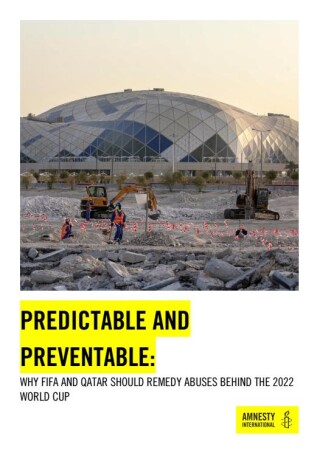The money should go to migrant workers who have suffered human rights abuses in Qatar during preparations for this year’s World Cup, it says in a new report issued today, six months ahead of the tournament's opening game.
The sum - the same as the prize money due to be handed out at the competition - represents only a small fraction of the US$6bn total revenue FIFA is expected to make at Qatar2022, it says.
Amnesty has estimated that the sum of US$440m is likely to be the minimum necessary to cover an array of compensation costs and to support initiatives to protect workers’ rights in the future.
However, the total sum for reimbursing unpaid wages, the extortionate recruitment fees paid by hundreds of thousands of workers, and compensation for injuries and deaths could end up being higher, it said. It added that this should be evaluated as part of a participatory process with unions, civil society organisations, the International Labour Organisation and others.
In an open letter accompanying its report, Amnesty and a coalition of human rights organisations, unions and fan groups urged FIFA president Gianni Infantino to work with Qatar to establish a comprehensive remediation programme. As well as providing compensation for all labour abuses related to hosting the tournament in Qatar, FIFA should ensure that abuses are not repeated, both in Qatar and in future tournaments.
Under the UN Guiding Principles on Business & Human Rights and its own policies, FIFA has a responsibility to remedy human rights abuses it has contributed to, said Amnesty International. This responsibility should cover not only workers building football-specific facilities such as stadiums and training sites, FIFA-accredited hotels and the broadcast centre, but also the services required to operate these facilities. This includes workers involved in building and servicing the transport, accommodation and other infrastructure required to host more than a million visitors expected to travel to Qatar to watch the tournament, it said.
In its 62-page report - Preventable and Predictable: Why FIFA and Qatar should remedy abuses behind the 2022 World Cup - Amnesty is calling on FIFA and Qatar to set up a programme with the full participation of workers, trade unions, the International Labour Organisation and civil society. They must also learn from the experiences of other remediation programmes, such as the scheme that followed the 2013 Rana Plaza disaster in Bangladesh, in which more than 1,300 workers lost their lives.
Agnès Callamard, Amnesty International’s secretary general, said: “Given the history of human rights abuses in the country, FIFA knew - or should have known - the obvious risks to workers when it awarded the tournament to Qatar. Despite this, there was not a single mention of workers or human rights in its evaluation of the Qatari bid and no conditions were put in place on labour protections.

“By turning a blind eye to foreseeable human rights abuses and failing to stop them, FIFA indisputably contributed to the widespread abuse of migrant workers involved in World Cup-related projects in Qatar, far beyond the stadiums and official hotels.
“For years, the suffering of those who made this World Cup possible has been brushed under the carpet. It is about time FIFA and Qatar came together to work on a comprehensive remediation programme that puts workers at its centre and ensures that no harm remains unaddressed.
“Under international law and by FIFA’s own rulebook, both Qatar and FIFA have obligations and responsibilities respectively to prevent human rights abuses and provide remedy to victims.
“The remediation fund Amnesty and others are calling for is entirely justifiable given the scale of abuses that have been suffered, and represents a small fraction of the US$6 billion revenue FIFA will make from the tournament.”
Commenting on the English FA’s role in supporting worker remediation efforts as part of Qatar2022, Sacha Deshmukh, Amnesty International UK’s CEO, said: “Thousands of migrant workers have been exploited and many have tragically died to make this World Cup possible, so we hope the FA and Gareth Southgate and the players will back this innovative scheme to secure much-needed compensation for long-suffering workers’ families.
“Nothing can bring dead workers back to life or restore the dignity of those who were trapped in conditions amounting to modern-day slavery during Qatar’s World Cup building boom, but a FIFA workers’ fund would still be an important move.
“International football can easily afford to do the right thing here. This is a comparatively small share of FIFA’s enormous prize money pot - and it would provide some real redress for the serious human rights violations that underpin this tournament.”
In 2010, FIFA awarded World Cup hosting rights to Qatar without requiring any improvement in labour protections, says the report. In the past 12 years, hundreds of thousands of migrant workers in Qatar have faced human rights abuses while employed to build the stadiums, hotels, transport and other infrastructure necessary to host the World Cup. The vast majority of Qatar’s migrant workers have paid illegal recruitment fees averaging more than US$1,300 per worker to secure their jobs, while up until 2020 all migrant workers were restricted in their ability to change jobs or leave the country, it says.
Since 2018, Qatar has introduced a series of important labour reforms that aim to improve workers’ rights, but a lack of enforcement means that abuses persist, says the report. Improvements for workers on official FIFA sites, such as stadiums, were also introduced in 2014 via the Supreme Committee’s Worker Welfare Standards, but these standards are not universally respected and only cover a minority of the hundreds of thousands of workers on World Cup-related projects. One positive initiative launched by the Supreme Committee in 2018 includes an agreement with contractors on official World Cup sites to reimburse the recruitment fees of 48,000 workers, though this again remains a minority of all workers who have worked on projects essential to the World Cup, it says.
Got a story? Email news@theconstructionindex.co.uk



